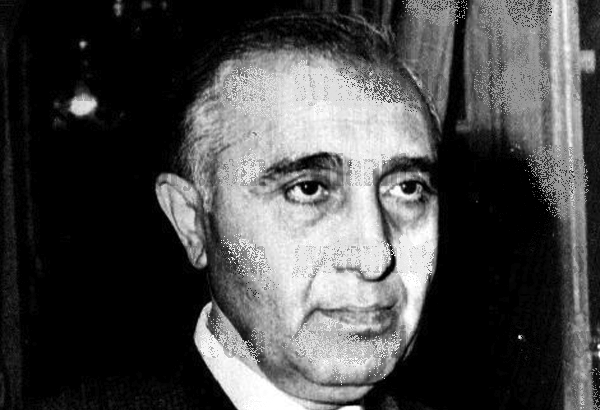Arab socialist, one of the founders of the Baath party: Who is Salah al-Din Bitar?
He was a pan-Arabist, Syrian politician who wanted to unite the secular and now 22 states Arab peoples in one state.

Syrian politician. He is one of the founders of the Baath Party. He was born in Damascus. He is the son of a very wealthy Sunni family. He studied at the University of Damascus and the School of Political Sciences in Paris. He worked as a high school teacher in his country from 1934 to 1942. He founded the Baath Party with Michel Eflak in 1940.
Salah al-Din Bitar, Arabic transliteration in full Ṣalāḥ al-Dīn al-Bīṭār, (born 1912, Damascus, Syria—died July 21, 1980, Paris, France), Syrian politician who served three times (1963, 1964, and 1966) as prime minister of Syria and was a prominent theoretician of Arab democratic nationalism.
Baath became a party that gathered nationalists in Syria, which was experiencing intense political turmoil after the Ottomans withdrew in 1918. Aiming to gather all Arab states in the Middle East under a single administration, the Baath Party program envisaged reducing social differences, limiting property in large lands and industrial enterprises, and expropriating in some areas. On the other hand, he declared that he recognized the rights of private enterprise, property, and inheritance and advocated a secular society.
Bitar played a role in the conflicts that broke out between France and Lebanon in 1943 and the events that resulted in the independence of Syria in 1945-1946. He was the editor-in-chief of the al-Baath newspaper published by the Baath Party. During the 1952 Suez conflict, he initiated the unification of the Baath with Ekrem Hurani's Socialist Party. However, within the party, he always prioritized the problem of Arab unity over socialism.
He took refuge in Italy in 1952 after the coup d'etat carried out by Colonel Edipçiçek (Şişakli) and lived here until Çiçek was overthrown in 1954. In the same year, he returned to his country and became a member of parliament. He was a foreign minister from 1956 to 1958.
After the nationalization of the Suez Canal, Syria, which established closer relations with Egypt, formed the United Arab Republic together with Egypt on February 1, 1958, with the intense pressure of Nasser and the approval of the Baath Party. Bitar became the minister of culture and national direction of this united republic. However, he left the post in December 1959 after falling out with Nasser.
Egypt's more influential role in the union gradually deteriorated relations, and Syria left the United Arab Republic after the military coup in September 1961. After a new period of turmoil, the Baath Party came to power again in March 1963. This government, in which Bitar played an important role, consisted of pro-Nasser unionists and pro-Hurani socialist separatists. General Attasi was put at the head of the government, which was overseen by a Revolutionary Council. Bitar also became a foreign minister.
After the declaration of the Egypt-Syria-Iraq tripartite union in April 1963, the Baathists embarked on a struggle to implement socialist reforms in their programs to strengthen Syria and Iraq. Nasser supporters in the government were eliminated in a military uprising in July 1963.
However, after a while, the unrest started again. The big landowners whose lands were taken from them, the merchants whose jobs deteriorated due to the protracted turmoil, the workers who became unemployed, and even the peasants who could not benefit enough from the land reform began to oppose the Baath. Amin al-Hafiz, chairman of the Revolutionary Council, had a temporary constitution drawn up in April 1964 and assumed the presidency of the government. However, when this did not relieve the unrest, the Baath formed a coalition government in May 1964, in which Bitar also took part, together with the independents, to overcome these difficulties.
The conflict between the two currents in the party, which has been going on since 1962, between the anti-Nasser socialists and the nationalists who advocated a privileged agreement with Egypt, intensified during this period, and Bitar resigned as a result of the opposition of the socialists called the Neo-Baathists (October 1964). A new Revolutionary Council and a predominantly Neo-Baathist government were formed to carry out the legislation until the new constitution was drawn up. However, in addition to the decrease in supporters of the government, the opposition of religious groups was added to the opposition of the bourgeoisie to the regime. The government was forced to resign. The Revolutionary Council was dissolved. A National Assembly, including liberals, was established by a decree having the force of law.
Bitar, who played an important role in the formation of the new government, announced that they aimed to put the regime on the right path by placing socialism within the framework of Arab nationalism. However, when the mixed structure of the government made the political and ideological divisions within the party more evident, General Salah Cedid from the Neo-Baathists seized power in a coup in February 1966. All powers were concentrated in the Baath Party, which came under the influence of the socialist Neo-Baathists. Among the arrested party leaders was Bitar. Bitar, who later fled, took refuge in Lebanon.
